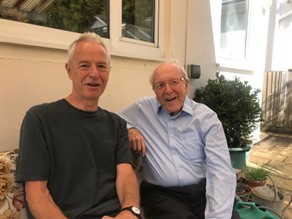1931 – 2025
Douglas Chamberlain died peacefully in his sleep on the evening of 21 May 2025. He was widely regarded as one of the leading UK cardiologists of his generation, combining a formidable work ethic with a kindness to staff and patients that could scarcely be equalled. His many interests and achievements included expertise in ECG interpretation and prehospital resuscitation, which together led to multiple publications and a major editorial role in the journal Resuscitation. At a more practical level, he helped establish the first public AED in the 1970s and in championing the involvement of paramedics for early defibrillation saved countless lives. But all this and a lot more can be found on his Wikipedia page and I prefer to devote the rest of this piece to my own experience of Douglas from the time in the late 1970s when I took up a 12 month registrar post at the Royal Sussex County Hospital (RSCH) in Brighton. Much that’s important about cardiological patient care I learnt during that 12 month period.

Douglas had a wonderful sense of humour and liked to tell the story of his early days at the RSCH where the cardiac department was, he said, equipped with just a single ECG machine – “that didn’t work”. By the time I arrived at the hospital problems with ECG machines had been remedied and Douglas had overseen the development of a well equipped CCU which he attended every morning at 8.30am. If he was late it was because he had been held up at Hove hospital, now gone, where he reviewed his patients before moving on to the RSCH. Yes, Douglas was an exceptionally hard worker and devoted huge energy to patient care. His twice weekly OP clinics often went on into the early evening, following which he would retire to his office to catch up on correspondence before going home. Working with Douglas was highly stimulating – but quite exhausting.
The attributes I describe, his sense of humour, his devotion to patient care and his work ethic are what made Douglas such a good doctor. But there was a lot more to Douglas that I would best describe as his intellectual curiosity. Douglas wanted more for his patients than the limited CCU care available before reperfusion therapy changed everything. Patients in the RSCH, like elsewhere, were dying of cardiogenic shock and Douglas responded to this challenge by instituting a programme of pulmonary artery pressure monitoring on the CCU – an invasive strategy that was probably unique outside of major cardiological centres. The programme documented clinical outcomes in response to various vasodilator and inotropic treatments that were published in major journals, adding to Douglas’ extensive publication record.
Douglas loved teaching and spent a lot of time rehearsing his 10 Rules of a normal ECG, widely regarded as a foundation to ECG interpretation that is used all over the world. He was particularly aware of the need to have his paramedics and CCU nurses properly informed about ECG danger signs and took it upon himself to drum these home to the benefit of Brighton’s elderly population.
Shortly after my time at RSCH finished and I found myself back in London, it was announced that Douglas had been elected President of the British Cardiac Society. This was the first time that this prestigious appointment had been made to a cardiologist from outside of a major cardiac centre. Truly a huge honour for Douglas but a reflection of the standing in which he was held by the UK’s cardiological establishment. National recognition followed in 1988 when he was appointed Commander of the Order of the British Empire (CBE).
Old NHS rules made Douglas retire from RSCH when he turned 65. But he never really retired and as Honorary Advisor to the South East Coast Ambulance Service he made himself available “any time of the day or night to take calls from paramedics.” He was always well up to date with the world of cardiology and continued to write and review material for Resuscitation and other journals well into his 80s. I kept in regular touch and whenever I found myself in Brighton I made sure to visit Douglas and his wife Jennifer when we discussed family matters and things cardiological. Douglas was a sound source of advice and I was fortunate to benefit from his mentorship throughout my career.
I write this as one of Douglas’ former registrars but anyone who reads my reflections will recognise the man I describe – one of those cardiologists who took his job seriously and made a real difference, not only to the patients he treated but also to the cardiological community both nationally and internationally. Douglas will be missed, particularly by those like me who had the privilege to work with him.
Adam Timmis
May 2025
Listen to Douglas describing open cardiac massage during his interview for the BSC 100 Voice Project in 2021.
